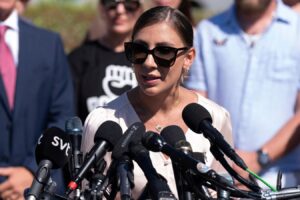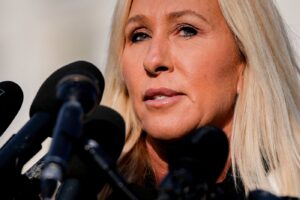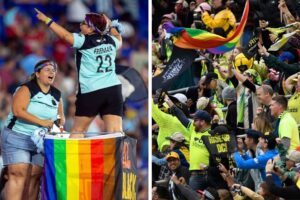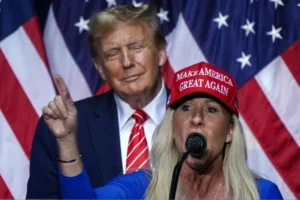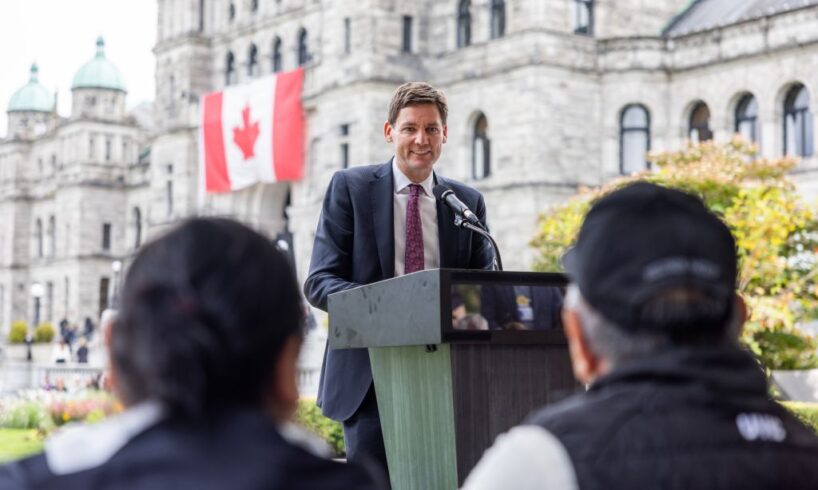
Now that autumn — with its chilly breezes, fallen leaves and early nights — has definitively arrived in Victoria, it’s time for British Columbia’s leaders to return to the legislature and get back to business.
The NDP government’s top priority for the fall session? Getting the North Coast transmission line closer to construction to entice more investment to the province.
“Right now, a lack of hydro power in our province is holding back major projects,” Premier David Eby told delegates at the Union of B.C. Municipalities conference in Victoria at the end of September. “This fall, we will introduce legislation to make sure we build the North Coast transmission line. We’re going to get it built.”
The forthcoming bill is aimed at expanding access to electrical power in northeastern B.C. by building hundreds of kilometres of new high-voltage transmission capacity and associated infrastructure. It will be the second piece of legislation in support of the project from Eby’s government.
The spring session saw the passage of Bill 14, the Renewable Energy Projects (Streamlined Permitting) Act. The new law put the BC Energy Regulator, a Crown corporation which oversees oil and gas operations, in charge of renewable energy projects as well as major new transmission lines. It also exempted the North Coast transmission line and other renewable energy projects from environmental assessments. Instead, the BC Energy Regulator will create a new process to assess the impacts of future projects.
Another bill this fall will open the door to offering First Nations and ownership stake in the project, according to Eby, and shift the way the province prioritizes major energy infrastructure sought by private sector projects.
“We used to say, if you’re interested in building in B.C., send your application in to BC Hydro, pay this amount of money up front and then in five years, we’ll deliver your transmission line,” the premier said in response to a question from The Narwhal. “That’s just not working anymore. It’s not the speed that we can work at. We need to ensure that we’re delivering faster.”
B.C. needs a new approach for building major power infrastructure to support economic development, according to Premier David Eby. His government plans to introduce legislation to make some of those changes this fall. Photo: Province of B.C. / Flickr
BC Hydro expects initial construction on the North Coast transmission line — a multiphase project involving upgrades and expansions to multiple electrical substations as well as the construction of new transmission lines — will begin next year and Eby is hopeful the project will be selected by the federal Major Projects office for further fast-tracking.
All B.C. needs is a little support from Ottawa to unleash the province’s potential to become the economic engine of Canada, Eby said — repeating a phrase he has been fond of using since U.S. President Donald Trump first began to threaten tariffs.
“If the federal government is looking for answers to how to build Canada’s economy, to weather this economic storm, I say to them, just look west, because it’s here in B.C. that Canada’s next chapter is being written.”
Rustad rejects reconciliation-related ‘friction,’ navigates party turmoil
Eby pulled no punches when asked about Alberta Premier Danielle Smith’s plan to pitch an oil pipeline that could transport Alberta oil to B.C.’s north coast for export to the Major Projects Office.
“There is no project … unless the Albertan government and the Canadian government are committing billions of taxpayer dollars to build this project. And if that is the plan, then they should be transparent about it,” Eby told reporters ahead of Smith’s Oct. 1 announcement.
However, Alberta’s pipeline proposal was met with approval from the BC Conservatives. Larry Neufeld, the party’s oil, gas and LNG critic said the project “will unlock economic reconciliation opportunities, such as jobs and long-term revenue-sharing, that will strengthen communities for generations.”
Economic reconciliation — finding ways for First Nations to participate in and benefit from economic development on their territories — is a limited form of reconciliation that does not always include recognition of Aboriginal Rights and title or Indigenous sovereignty. BC Conservative Party Leader John Rustad is a fan of the term, claiming it avoids the friction that comes from prioritizing Indigenous Rights.
“I believe very strongly that it’s long past time First Nations fully engage in the economy and have the opportunity to benefit,” Rustad said during his address at the Union of B.C. Municipalities conference. Reconciliation efforts in B.C. to date — including the enactment of the province’s Declaration on the Rights of Indigenous Peoples Act — has only served to stoke tensions between First Nations and other B.C. residents, Rustad told the crowd before reiterating his promise that a BC Conservative government would repeal the Declaration Act.
BC Conservative Party Leader John Rustad says reconciliation efforts in B.C. so far have caused unnecessary “friction.” He believes the province should focus on economic reconciliation with First Nations. Photo: Union of BC Muncipalities / Flickr
Rustad’s interest in staying at the forefront of discussions with First Nations was made clear last week when he became the party’s Indigenous relations and reconciliation critic, bumping Columbia River-Revelstoke MLA Scott McInnis from the role he held since the 2024 election.
The Conservative critic shuffle was prompted by Rustad’s abrupt ejection of Surrey-Cloverdale MLA Elenore Sturko from the caucus at the end of September. Sturko was kicked out shortly after the results of Rustad’s leadership review — which was dogged by accusations of vote-rigging — became public. Rustad did not give a reason for giving Sturko the boot, though she has suggested she was removed over fears she would continue to raise concerns about the integrity of the leadership review process.
Sturko will now sit as an Independent MLA alongside Peace River North MLA Jordan Kealy, who left the party in March over Rustad’s decision to kick Vancouver-Quilchena MLA Dallas Brodie out of caucus over her offensive comments about residential school survivors. Brodie went on to form her own party, One BC, with former Conservative caucus mate Tara Armstrong, the MLA for Kelowna–Lake Country–Coldstream. Armstrong also quit the Conservative caucus following Brodie’s departure.
The Conservatives now hold 40 seats in the legislature, to the NDP’s 47 and the BC Green Party’s two.
New B.C Green Party leader could help reshape relationship with the NDP
The BC Greens are going into their second legislative session without a party leader in the house. On Sept. 24, party members overwhelmingly voted for 25-year-old climate justice advocate Emily Lowan as leader.
Lowan — who campaigned on a promise to “tax billionaires out of existence” — has been critical of the NDP government’s climate policies and the Green caucus’s cooperation agreement with the NDP.
Newly elected BC Green Party Leader Emily Lowan says she is planning to tour the province in the coming months. Photo: Union of BC Muncipalities / Flickr
The agreement — which was announced in Dec. 2024 and commits both caucuses to work together on shared priorities — is up for renegotiation at the end of the year.
Green Party house leader Rob Botterell told reporters the agreement has been successful — citing work on affordable housing policy, community health centres and efforts to permanently protect the Fairy Creek watershed from logging — but that he and fellow MLA Jeremy Valeriote will be discussing potential changes with Lowan in the weeks to come.
“We’re going to have a close look at the progress we’ve made and then assess what is the best approach forward on those issues,” he said.
Without a riding to represent, Lowan’s presence in the legislature will be limited and — with the fracturing of the BC Conservative caucus over the past year — her party no longer holds the balance of power in the house.
The new Green leader has her sight set on offering voters a credible progressive option by the time the next election is called.
“We need to rebuild the base and the profile of our party to ensure that we’re a formidable threat to the BC NDP because I do feel that they take their progressive voters for granted,” she told reporters following her election as party leader.
With no obligation to stick around Victoria this fall, Lowan said she’s planning a tour of the province — which she quipped might be called the Fight the Oligarchs tour.
